Chinese seniors in Shanghai are picking each other up at their local Ikea
Shanghai
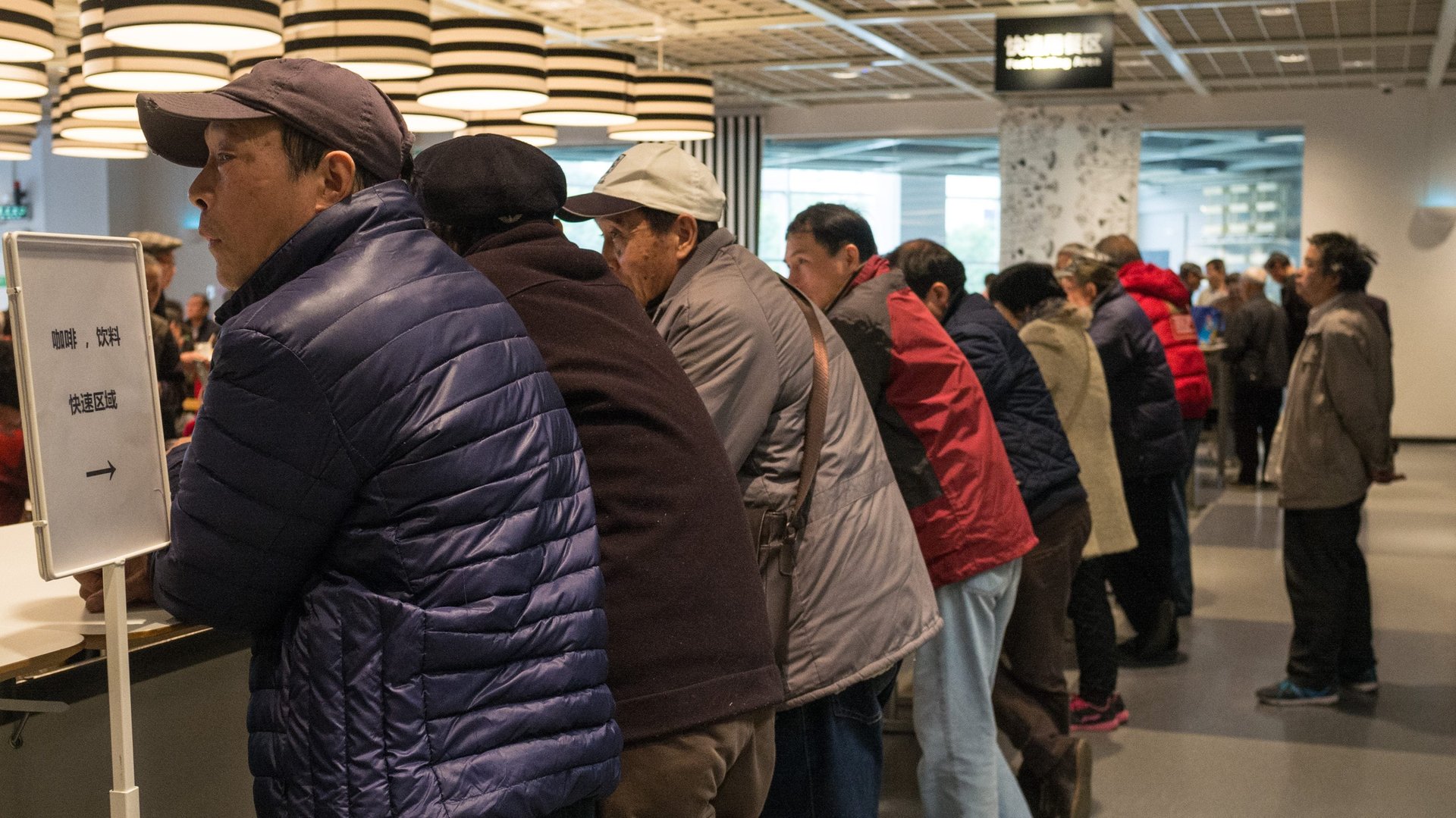

Shanghai
On a recent afternoon, Sun Zhicheng, a 70-year-old retiree from Shanghai, walked into the cafeteria of the Ikea store in the city’s central Xuhui district, just as he has every Tuesday and Thursday for the past three years. He ordered two shrimp cakes and a bottle of grape juice, which cost him 20 yuan, or a little less than $3.

Sun was dressed in a navy blue suit, and wore his dyed black hair slicked back. The only tell-tale sign of his 70 years was a cluster of white hair at the end of his right eyebrow. For about an hour, he sat there all by himself, peering at the other patrons cruising around the nearly full 700-seat cafe. During that time, he only took one bite of his cake.
He was not there for the food, or the furniture, he was looking for a wife.
For several years, elderly Shanghai widows, widowers, divorcees, and the rare never-marrieds have met regularly at the cafeteria of Ikea’s Xuhui store seeking new mates. Sometimes hundreds strong, the group’s members would stay for hours without buying anything, until the Swedish retailer cracked down in October, banning freeloaders from the cafe.
Now Shanghai’s seniors and the Swedish furniture giant are in an uneasy standoff: hundreds of seniors are still coming on Tuesdays and Thursdays looking for love and eating little, while security guards and cafeteria attendants try to hustle them out so younger, bigger-spending customers can take a seat. It’s a vivid example of the uncertain future facing China’s elderly population—modernizing cities and the weakening bonds of extended families are leaving them less of a role in society, even as their numbers grow, and grow.
Thanks to Beijing’s recently ended one-child policy, the number of Chinese over 60 is expected to grow until at least 2050, when one in four, or 350 million, will be over age 65. Shanghai is already the greyest major city in the country, and by the end of 2015 about 30% of the locally registered population was over the age of 60, twice the national figure. People in Shanghai also live longer than the average, meaning they’re outliving first wives and husbands, and looking for love and companionship well into their 80s.
On a recent Tuesday afternoon, I visited the Ikea cafe to talk extensively to several of the seniors looking for matches there. Ikea, they admit, is an unlikely place to cure loneliness, and a strange one to try to spark a second marriage—but they linger on, because they have no where else they’d rather go.
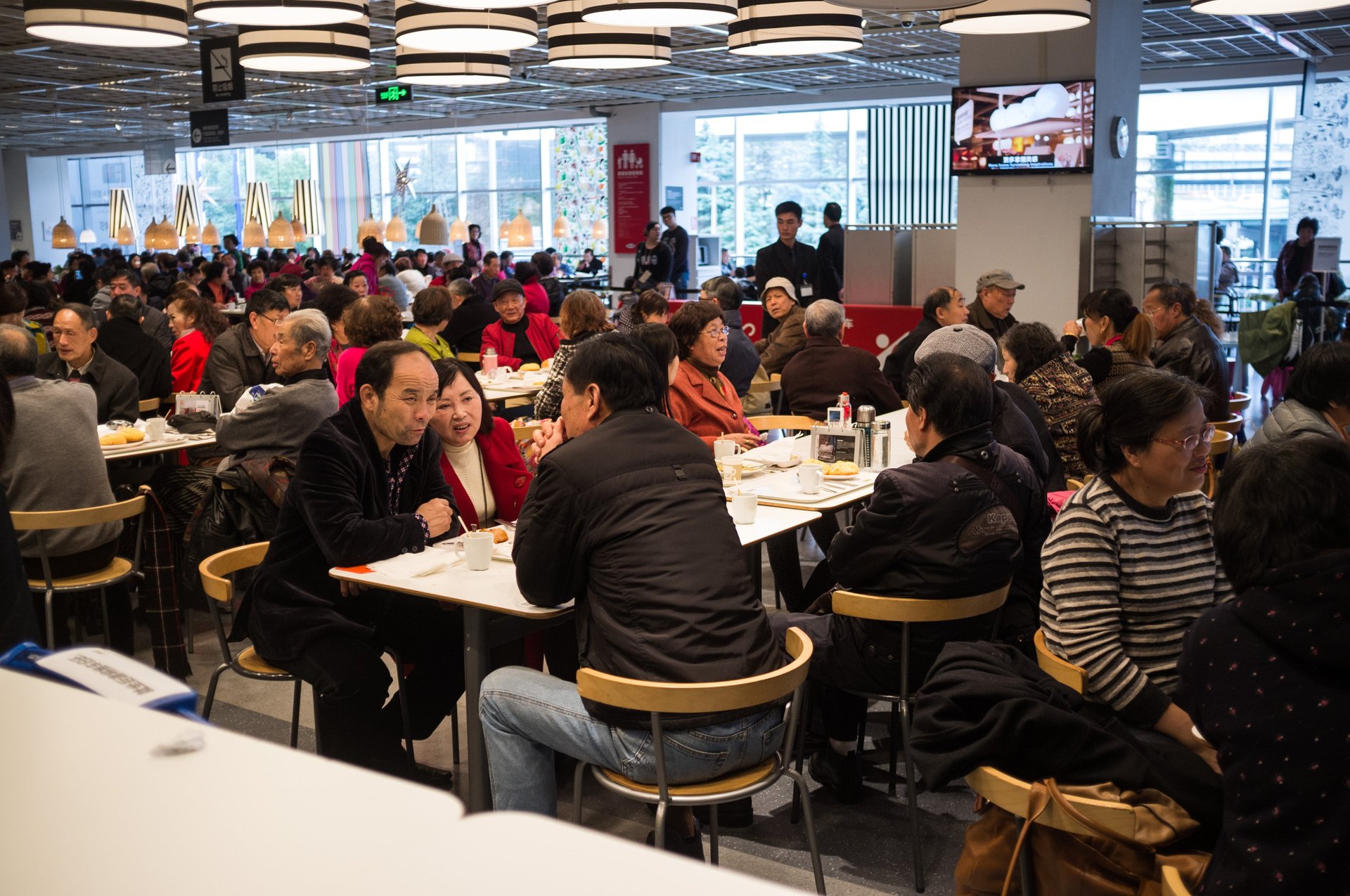
Sex and property, but not much love
In Sun’s own words, the 20 yuan he paid for food so he can hang out at the Ikea cafeteria is a “welfare lottery.” The big prize is finding someone to share the rest of his life with, after a divorce he said he doesn’t want to talk about. “I’m here to give myself some hope,” he said, but he doubts he’ll actually “win the prize.”
In the past three years, Sun has met several women he liked, but they haven’t liked him back—mostly, he claims, because of his financial status. He gets a monthly pension of 4,000 yuan (about $580), and owns a one-bedroom apartment that’s 30 square meters, a comfortable situation for a Shanghai retiree, but he’s not wealthy by any means. He’s also met women who like him, but who he thought were “nagging” or had “bad auras.”
“Shanghai’s female comrades are pretty shrewd,” Sun said of the women cruising at Ikea. They say “If I marry an old guy, it’s just like I’m a woman in my prime getting married, it’s formal.” That means she wants to be in charge of her partner’s salary and savings, and even inherit his property for her own children if he dies.
For seniors, finding true love at Ikea is just as tough as any other Chinese singles event. Chinese people traditionally want a marriage that is evenly matched in terms of salary, property, and family background—it is never just a combination of the husband and the wife but also of their two extended families. This is especially true for these elderly patrons, whose first marriages followed this pattern decades ago.
That’s not to say everything is traditional. Seeking casual sex at Ikea, while uncommon, isn’t unheard of. There’s a handful of senior men and women who come on Tuesdays and Thursdays just to find sexual partners, several patrons said. One of these even slept with both an Ikea cafe regular, and her daughter, who is in her 40s, two people told me.
There’s a “vicious circle” in the dating scenes at the Ikea cafe, said Xu Jianmei, a 59-year old with wine red hair, tattooed on eyebrows, and giant gold hoops, who was on her third visit. “Women are afraid of men coming for sex, and men are afraid of women coming for money,” she said.
Xu, originally from nearby Nantong city, said she was unusual, as she “sincerely wants to find someone to spend life” with. Her two daughters, who own big apartments in Shenzhen and northern Qingdao city, want to “have nothing to do with” her future spouse, or his potential money. Still she got rejected many times for simply being an “outlander,” meaning that she is originally from another part of China.
Although Shanghai is considered a very international city, locals, particularly older ones, still seek other locals first, making the dating scene tough for anyone who has migrated to the big city from outside. Given the mass migration in China from rural areas to big cities, and between cities as well, that’s a situation that comes up a lot.
Liu Xiaoying, 61, who is originally from Beijing, told me that she rebuffed one guy because his first line was “Are you a Shanghainese?” Liu, who was wearing a purple down jacket, and had short grey hair, migrated to Shanghai with her Shanghainese ex-husband in 1986. She has been living the city for 30 years , has a local household register, and a nice apartment—but she’s not Shanghainese enough for indigenous Shanghai people.
“The sea can hold the water from thousands of rivers” is an oft-used Chinese idiom to describe Shanghai’s acceptance to different cultures. But what the city really holds, Liu said, are just “those from overseas, and those with money.”
After talking with over a dozen seniors at the Ikea, I realized that successful matches were rare. The one example that anyone could remember was two well-off academics in their eighties, both of whom had worked in the US before.
No city for old men and women
Decades ago, most Shanghainese lived in crowded and sometimes shabby stone and brick houses connected by narrow, straight alleyways, known as longdang in the local dialect. Most of them have been destroyed to make way for high rises.
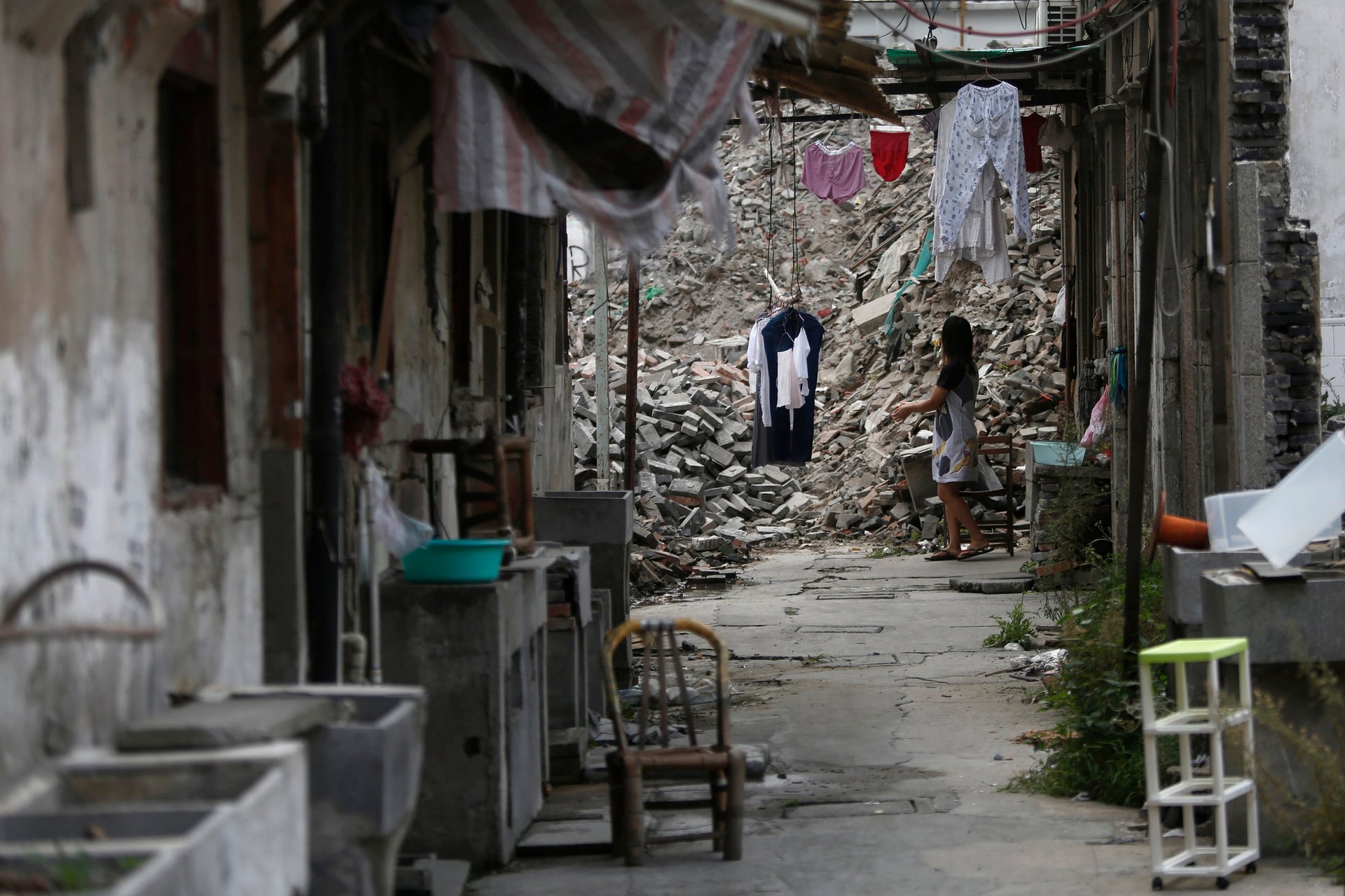
The poor condition of housing aside, there used to be more intimate social engagement between neighbors, especially among the elderly, who would bring their bamboo lounge chairs to lanes on summer nights, or hang out at the nearby Laohuzao stores for hot tea and baths during winters.
As the alleyways were torn down, other things changed about getting old in China, too. First, seniors in China don’t always live with their grown children, as was common 20 or 30 years ago. The ideal Chinese family used to be described as “four generations under one roof” (my grandparents, my parents, me, and my son or daughter, ideally son). But now that seems unfathomable in the cities, partly because self-centered young couples now want more time to themselves, and partly because new apartments they can afford don’t have enough room for their parents, too.
The new apartment buildings have few common areas in which to hang out. True, there are the hundreds, if not thousands of, government-backed “senior activity centers” scattered through Shanghai, but these are essentially smoky mahjong rooms, seniors at Ikea say. And other businesses, especially Chinese ones, don’t offer the comfy environment and mostly open attitude that Ikea does.
Besides taking the hourlong train ride from his home to Ikea on most Tuesdays, Sun spends his time wandering around nearby parks to chitchat with random people the rest of week. His regular Ikea stop is a chance for him to “observe the society,” he said, “otherwise I would have had Alzheimer’s disease if I always stay at home.”
Because searching for an ideal spouse is difficult, many seniors at Ikea said they don’t really care about finding one. Instead, they enjoy just hanging out with other lonely hearts who have nowhere to go except the cafe. In Sun’s case, he sometimes goes for group dinners with other elderly patrons, regardless of whether there’s a potential date or not coming too.
Wang Xuelian, 58, spent most of a recent Tuesday afternoon with Li Hong, 59, who she just met at the cafe a couple of weeks ago. The two Shanghai “aunties” told me more than once that it doesn’t matter whether they find a spouse here. Some of “these old guys are too poor, we just ignore them,” said Wang.
Their chat is predominated by their family, and mostly their children. “It’s Hermes. Two bags, 150,000 yuan. The little girl is always buying like crazy,” Wang said of her 24-year-old daughter-in-law, in a tone which is a mixture of complaining and bragging, as she showed a photo on her phone to Li. She scrolled to another photo of her daughter-in-law’s wedding ring, of which the diamond alone is worth 50,000 yuan, she said. Li changed the subject, to say that her 35-year-old daughter works as an executive of a big-name local cosmetics firm and earns a decent salary.
The Ikea cafe even attracts married folks, trying to kill time.
Xu Yunxian, 83, from Shanghai, has routinely hung out with her 90-year-old husband at the Ikea cafe twice a week over the past six years. The couple usually comes to the cafe at around 9am and heads back home after lunch. The rest of the week, they cruise around other shopping plazas near their home. Xu said they need to “walk and take a look outside” because “time passes faster” this way.
Liu, the Bejinger, said she would invest in a tea house for senior citizens if she had enough money. It would better be a two-story building (because “old people won’t willing to climb the stairs”) that doesn’t charge too much for tea, peanuts and fried sunflower seeds.
What Sun wants is a non-commercial space especially designed for the elderly, single or not, where they can “buy some tea for three to five yuan,” and listen to Shanghai opera. “These people should have won some sympathy,” he said, referring to China’s elderly, because they “are gradually perishing.”
A Swedish firm steps into a Chinese dilemma
How Shanghai’s seniors wound up in Ikea in the first place is another example of how the Swedish chain’s liberal, customer friendly policies can be exploited around the world.
Back in 2007, Ikea’s Xuhui store introduced a free membership plan that included discounted sales, free wifi, and free refillable coffee at its cafe. The free services, along with the store’s convenient location, air conditioning, and clean, cozy environment, soon attracted retirees, who gathered to kill time there. They included a dating group which originally met at the famous “blind date corner” at the People’s Park. Word spread quickly and suddenly hundreds of seniors looking for dates were showing up at the Ikea cafe on Tuesdays and Thursdays.
Ikea was tolerant of these “guests,” who would sometimes bring their own food from home and take up most of the seats in the cafeteria, until recently. “The staffers of the Ikea store have since received many complaints from other consumers that they can’t find a seat, and that the dining environment of the cafe is not satisfactory,” Vivian Tang, a store spokesperson told Quartz via email.
In October, Ikea started cracking down, asking customers to order food before they are seated, and cordoning off the cafeteria area with a row of standing desks. Security guards stand at the entrance and patrol the cafe everyday from 9am to 5pm.
The store had previously warned the group against bad behavior and changed the layout of the cafe, but these efforts failed to limit their number, Tang said. The new measure is welcomed by many customers, and has effectively curbed “uncivilized” behavior at the cafe, she added.
“We welcome everyone to Ikea to enjoy shopping and food, regardless of their ages and gender,” she said. The store cares about old people’ needs, and provides wheelchair services for them, Tang noted. “Our trouble comes from some uncivilized dining behaviors, and we hope everyone can work together to create a pleasant shopping experience.”
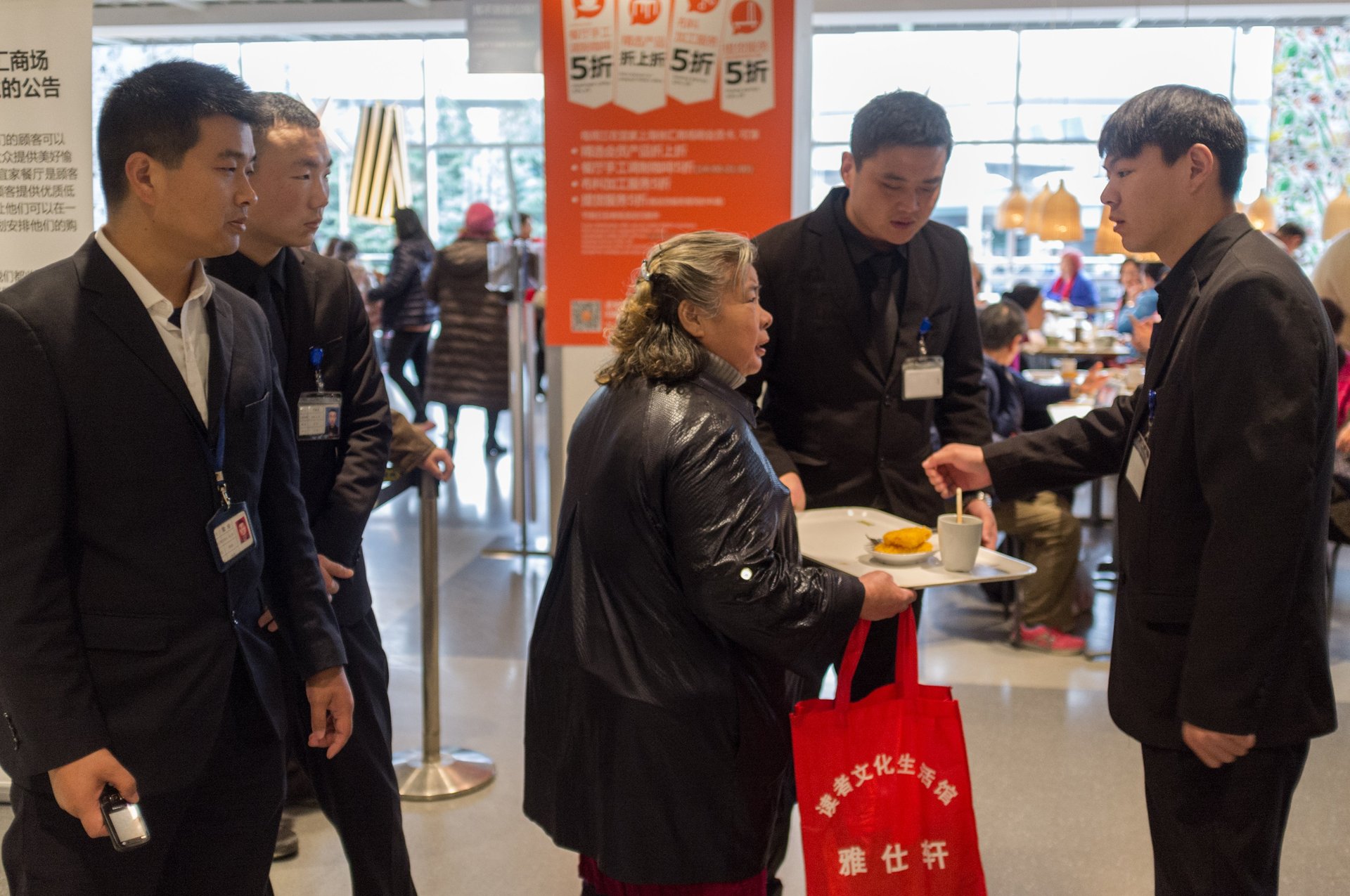
Ugly incidents including spitting, having fist fights, and stealing spoons and sugar did happen in the past, but rarely, many elderly patrons told me. Sun said he always purchased something to begin with, but he’s not happy about the new rule. “When they used to have bad business, these people helped them attract customers,” he said. Now they’ve been abandoned like “beggars” once the store is better off.
The Ikea cafe was packed with elderly patrons on the hectic Tuesday afternoon I visited, while some young people were forced to stand to have their late lunch. Outside the wall built by the standing desks stood dozens of old people who didn’t want to pay anything. At one point, an old man slipped into the paid area by going underneath a desk, but he was soon escorted out by two security guards.
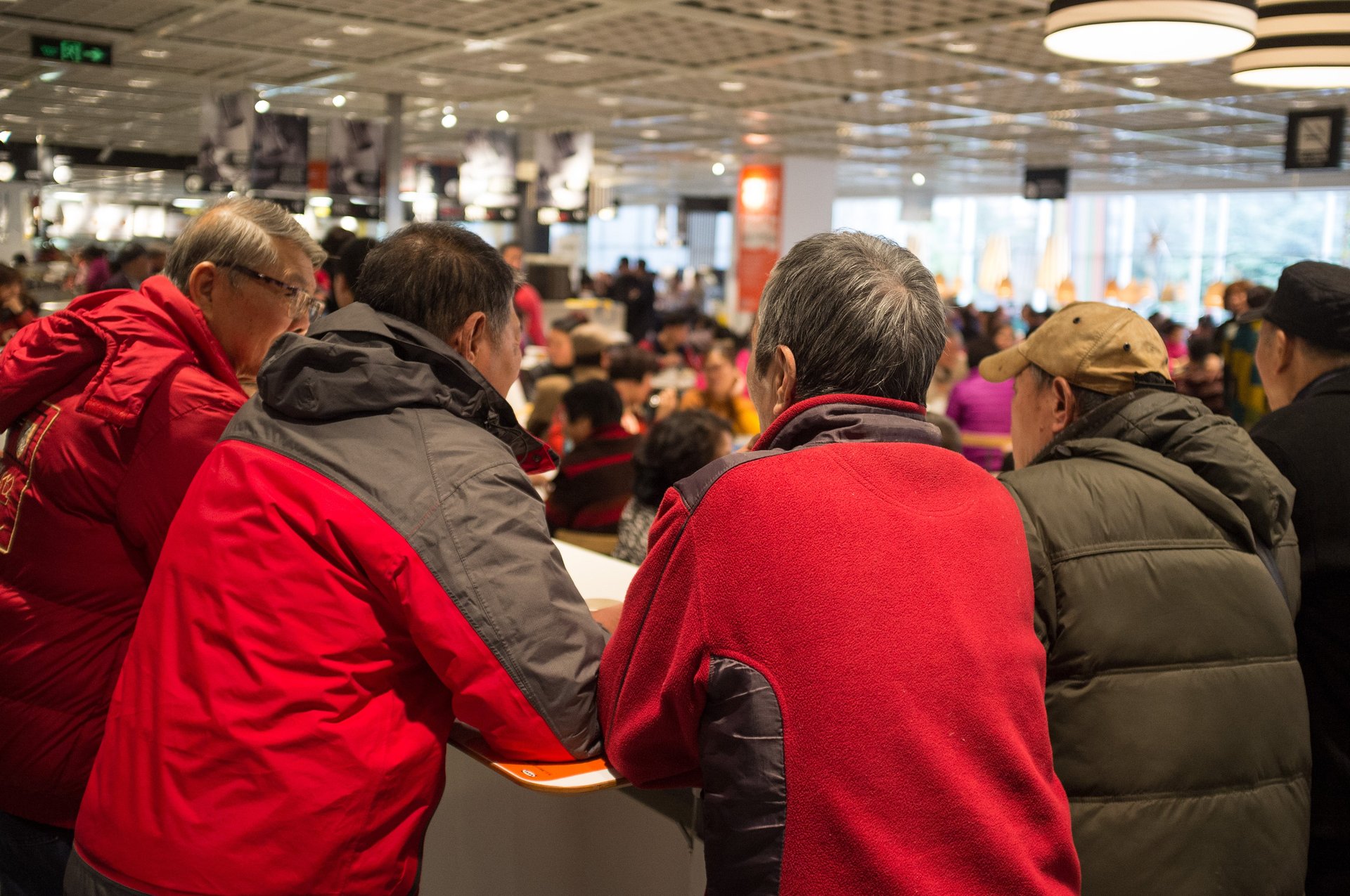
“It’s not that we don’t want to buy food,” a 59-year-old woman standing outside the cafe explained. “We just had lunch, the stuff here is not good, I don’t like cake or bread.” The new regulation treats them like criminals, she said. She almost wants to give up the place, “but it’s too boring to stay at home.”
Toward the end of the day, a service staffer abruptly took away the empty food trays belonging to two seated women without even asking them, even though customers usually return their food trays themselves. The duo, who appeared to be in their 50s, left awkwardly shortly after that, headed out into the gray, chilly evening of Shanghai.
Sun Zhicheng, Wang Xuelian, and Li Hong are pseudonyms at the request of the interviewees.
Lu Botao and Tom Tsui contributed to this article.